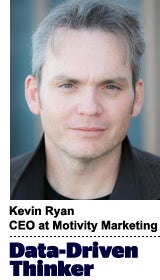“Data-Driven Thinking” is written by members of the media community and contains fresh ideas on the digital revolution in media.
Today’s column is written by Kevin Ryan, CEO at Motivity Marketing.
Surviving without Facebook should be easy for any advertiser to do. From a success measurement perspective, it should be just another interchangeable channel on the media plan. Typically, brands with big dollars will get an audience with Facebook and they can influence major change on the platform.
Yet, so far in the wake of the Facebook boycott by big brands, the social destination appears to be listening but not doing much. But this non-response won’t matter to larger brands with access to alternative tools and intelligence to use instead.
Now, what about the rest of us?
Of course, Facebook for many has become a primary communication point with their customers, but most advertisers choose the path of least resistance when advertising in this social channel and don’t make the most of their buy there, let alone diversify. Such an easy path equates to a heavy dependence on off-the-shelf buying and the basic measurement tools offered by Facebook. This dependence, worsened by lack of imagination, is the crux of our collective issue.
You may have noticed ads are cheaper these days, but this is about more than cost efficiencies. Time is of the essence in taking action to reduce dependency on Facebook – because the loss of the net gains currently enjoyed will leave you flat-footed when the economics shift again. Where exactly all this nets out for anyone advertising on Facebook is a story yet to be told. Whatever the outcome, Facebook has an obligation to its shareholders, not the populace or the advertisers, so guess who the “solution” will likely favor.
Reducing dependency requires the right talent
Technical assets such as dashboards and data aggregation tools have never been more accessible, but getting the right talent in place to separate knowledge and wisdom has been difficult.
Right now, there’s a lot of exceptional talent out there with time on their hands – people who would not normally be sidelined if not for the pandemic. Getting serious talent for less money is a dirty little consequence of the nosedive that no one likes to talk about, but I assure you there’s world-class talent in them thar hills.
I’ll add a caveat on talent. For some reason, advertisers have the bad habit of relegating intelligence to a percentage of media spend. Don’t do that. Data is cheap. Knowledge is attainable. Wisdom is priceless and shouldn’t be reduced to a small percentage of an even smaller budget. If the intelligence you hire charges $10 for every $20 you spend, you are still ahead of the game if the returns are justified. Be open to changing the way you think.
On-demand measurement and tools
Measurement tools are another interesting category where advertisers can reduce their dependency on Facebook. It has never been cheaper to have someone build something functional such as dashboards tailored to an advertiser’s needs.
There’s another huge chasm between available information and ways to effectively harness it. Again, advertisers still need talent to tune it and make the information usable.
Tools were cheap before, now they’re dang cheap. In this category I place the many fine digital advertising software platforms. Advertising tech has woken up to the meaning of – if not a complete understanding of – managed services, or what an agency’s media department used to do. The good ones have minimums and tack on managed-service fees, but I’m sure they will work with smaller advertisers “in these trying times.”
It’s important for us to keep our chins up. If advertisers can do half of what I’ve laid out here, the other side of whatever “this” is will look a whole lot better.
Follow Kevin Ryan (@KevinMRyan) and AdExchanger (@adexchanger) on Twitter.












